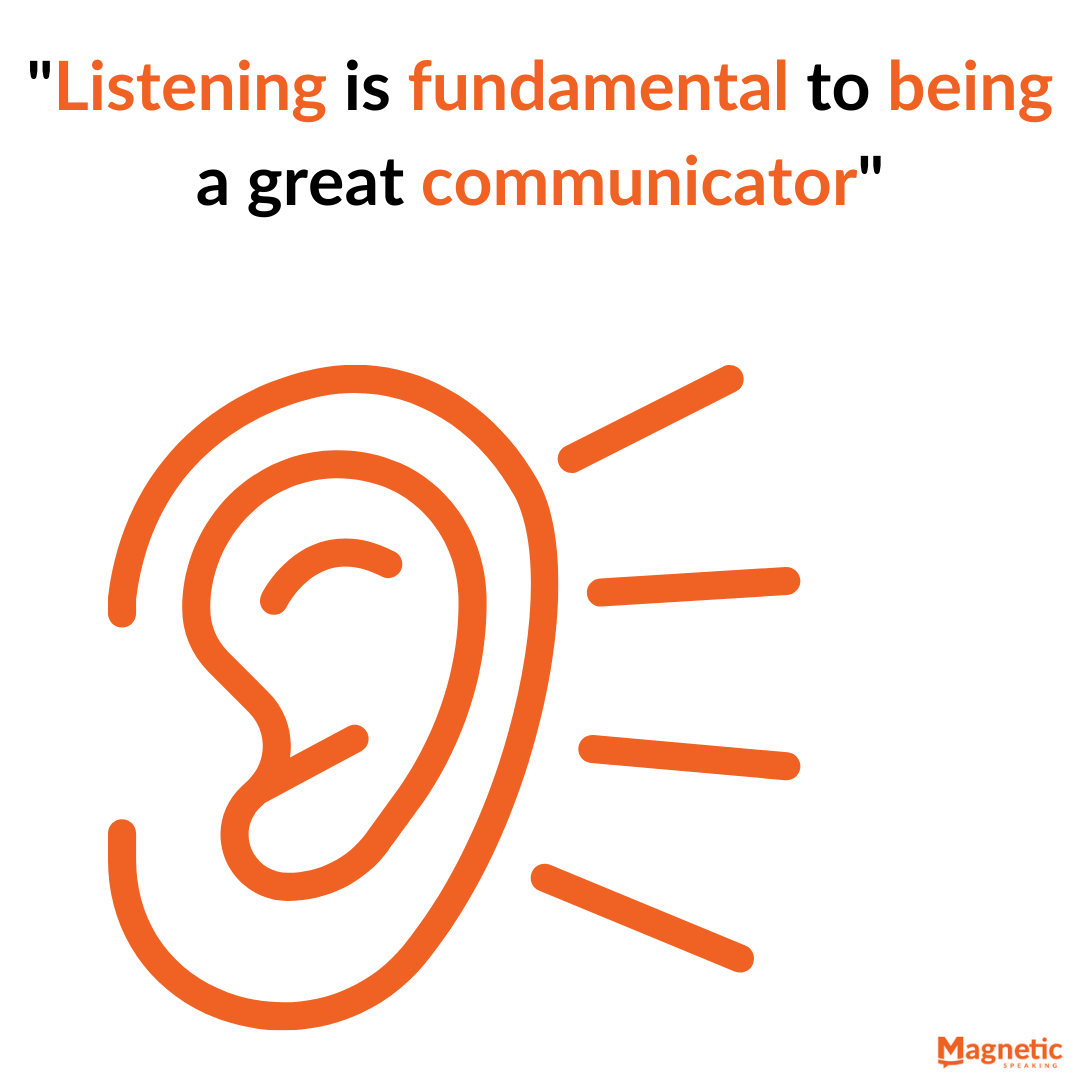I know you can improve your communication skills at work. I know that because I’ve done it, and our company has seen thousands of professionals do it.
It isn’t magic, but you need to approach it with the right mindset and tools. Otherwise you’ll waste time without making progress and think great communication is only for a select few.
In this article, I’ll walk through 12 tips to improve your communication skills at work right now – 8 to do on your own and 4 involving outside help.
These tips will help in formal presentations, written communication, phone calls, speaking up in meetings, managing conflict, and more. You’ll be able to apply them in 1-on-1 conversations, small groups, and large groups.
8 Tips to Do On Your Own
If you’re like me, you’ll try to improve on your own. That shows you’re motivated – great! Use any of the tips below and you’ll see an immediate benefit.
1. Analyze speakers you admire
I’m sure you have someone who’s communication you admire. Maybe you’re even jealous. That’s okay! It means you can learn something from them.
Visualize them right now. What makes them stand out? Do they start their presentations with a question? Do they make clear and confident eye contact? How do they handle conflict?
Jot down a few habits they have and try them. It might feel weird, but that’s how you’ll break past your normal habits.
2. Customize your communication to the situation

When your communication medium changes, your communication needs to change. This is something I notice is overlooked more and more these days.
Have you ever received a MASSIVE email from a coworker? Great communicators don’t do this. They know that work emails should be punchy and straight to the point. And if they need to explain a lot, maybe a phone conversation or meeting is better.
Another example is speaking up in meetings. Keep it short! Meetings are not the time to ramble and take up all the space in the room. Great communicators don’t need to say all their points at once. They can prioritize and mention one or two, and wait to add more.
And for any content that’s sensitive, go for live communication. There’s less room for misinterpretation.
3. Ask your manager directly for opportunities to present
Ask, ask, ask. So many of our clients are shocked at how opportunities open up for them when they ask.
It doesn’t have to be big. You can ask your manager to have you present something brief in your next team meeting. Or to give an update on a project you’re working on. The more opportunities you have to speak, the better. You’ll desensitize yourself to the spotlight, and you’ll be open to bigger opportunities.
4. Jump into the conversation instead of being asked
I still remember the first time I spoke up in a meeting. I just raised my hand and asked a question. It was a big deal for me. Early in my career, I only spoke when I was asked to.
If you’re used to speaking up only when you’re asked, you’re missing out on a big part of your speaking. You’re losing a key ingredient.
Push yourself to even just ask a question. Then start voicing an opinion. If you’re not used to it, it will feel like moving a large boulder. But over time, you’ll trust yourself in the moment and speak without overthinking it.

5. Understand the situation (or audience) first
If you want to be a great communicator, you need to “calibrate” yourself to the situation or audience. This means that you change your communication depending on the desired objectives.
If you’re in a meeting, what is the objective? Let the objective be the anchor to why you’re speaking. If your team is talking about solving one problem, it’s not the right time to bring up several others.
And think about your audience. If you’re in a meeting with your executive team, what is it that they’re looking for? What does your manager want in your 1-on-1s?
But remember, great communicators know that it’s not always about outcomes. You need to change your communication style for small talk and casual situations. If you know a coworker likes to chat for a few minutes before a meeting, don’t just jump right in and ignore their small talk questions. This is something we’ve coached our clients on who are eager to get things done. While that’s great, you need to build rapport too. Great communicators understand this.
6. Listen to what’s being said, not what you want to hear

Think back to when someone has remembered a small detail about you. Or when they accurately understood what you were trying to say. I bet you were surprised at how well they listened.
Listening is fundamental to being a great communicator. But specifically listening to what is being said, not filtering the information through your own desires.
Excellent listeners are rare. Practice this by clarifying – paraphrase or repeat what you heard. You’ll build your listening accuracy this way.
Trust me, your coworkers will notice.
7. Give acknowledgement and credit
In a recent Facilitation Bootcamp, we had participants start their mock meetings with an “Energizer” – a way to increase the energy in the group. One participant did the “Acknowledgement” energizer by giving acknowledgement to an individual in the room, letting them know how much she appreciated the effort her team member put in to solve a recent issue. Like magic, everyone in the room brightened up. The participant couldn’t believe how effective it was.
Study after study has shown how effective acknowledgement is for morale, productivity and rapport. You know this yourself if you’ve been appreciated in front of the group.
The great part is that you can do this immediately without any training. Notice where your coworkers have helped and give them credit!
8. Use a concise story to make a point
Stories are influential, whether people want to admit it or not. Even the most analytical, data-driven professionals we’ve worked with love a good story. Stories bypass our critical filters.
Start using them in everyday work situations. If you struggle with telling stories, here’s a quick strategy: zoom into a specific moment in time. Think about something specific that happened today or last week. That will help you stay concise.
I’ll be honest – this tip is one of the bigger struggles for our clients and can be hard to implement if you aren’t used to telling stories. So I recommend doing the Storytelling Bootcamp if you’re stuck.
4 Tips Involving Outside Help
I’ve added these 4 additional tips for a simple reason: it’s impossible to see all your blindspots. At some point, you will plateau by only doing it on your own and may feel overwhelmed. All of us at Magnetic Speaking have been there. So we got outside help.
1. Get feedback from your manager/team
I still remember getting feedback from my manager in my first job. She told me I looked disengaged in meetings. At first, I was embarrassed. I didn’t know why that was the case. Over time, I started noticing there were unconscious things I was doing – my posture, my facial expressions, and my lack of speaking up. I’m glad she told me – there’s no way I would have noticed on my own.
That’s why you need feedback from others to help you improve. As a bonus, it’ll show that you want to improve and that you’re open to receiving feedback. You’ll stand out as a leader.
2. Get an assessment from a professional coach
If you’ve already reached out to your manager or a trusted teammate but are getting generic feedback such as, “you need to be more expressive” or “you need to better engage the audience” then you need to seek out a professional coach.
It can be frustrating getting feedback that just confuses you more. When I talk to clients who have gotten this feedback they feel more lost than they did before and now need a professional solution.
A speaking coach will give you specific feedback on where you need to improve NOW and also HOW to do it.
3. Take a live public speaking class

If coaching is too expensive or you can’t find the right speaking coach for you then another option is to get into a live public speaking class (can be virtual!).
This is the next best option because you’ll be learning techniques, strategies and tips on how to be a better speaker as well as getting feedback from the instructor.
Being involved consistently in live public speaking classes will help you be the best speaker on your team, confidently telling engaging stories with ease.
4. Practice communication skills outside of work
Have you ever tried something new and had it backfire?
I’m sure you have, and I’m also sure that you know that feeling doesn’t always sit right. This is why you want to practice new speaking or communication techniques in LOW-STAKES environments first before taking it into the business world.
What you can do here is to practice speaking techniques with friends, family or your spouse before testing it at work. Then see their reaction. If they seem thrown off by it and it didn’t work then you know you should work on getting better at that before using it in your next presentation.
You can also join an improv group, networking club or Toastmasters organization to practice your new skills there before taking it to the big leagues.
Bonus tip:
Improve your communication skills at work one at a time so you don’t overwhelm yourself with a big list of “to do’s” every time you go to speak.
When you want to improve your communication skills at work it’s important to start taking action immediately. Oftentimes people will say their communication skills aren’t the best and then they do nothing about it!
You have to do something to start improving your skills. Start by looking at a speaker you admire and see what they do well. You can also take initiative by asking your manager to have you present more. You can jump in the conversation in meetings instead of waiting to be asked your opinion. And so much more!
Then after you work on your skills a bit, it could be beneficial to get outside feedback as well from others. That way they can help point out any blind spots you may have.
You can ask your manager or spouse or friends for feedback on your speaking skills. If you’re only getting generic feedback then it may be valuable to go to a public speaking coach and take some live classes.
Remember, when improving your communication skills at work you should start one at a time. Start with the skill that you think will give you the most out of for the time invested.




